
The Cyperaceae are a family of graminoid (grass-like), monocotyledonous flowering plants known as sedges. The family is large, with some 5,500 known species described in about 90 genera, the largest being the "true sedges" genus Carex with over 2,000 species.

Carex chordorrhiza, commonly called creeping sedge or string sedge, is a species of perennial plant in the family Cyperaceae with Holarctic distribution growing in acidic bogs.
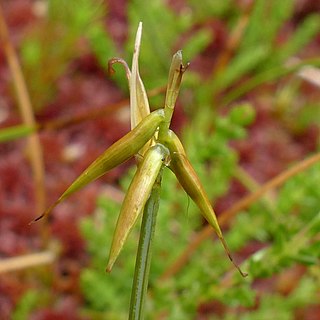
Carex pauciflora, known as few-flowered sedge, is a perennial species of sedge in the family Cyperaceae native to bogs and fens in cool temperate, subarctic, and mountainous regions of the Northern Hemisphere. The specific epithet pauciflora refers to the Latin term for 'few flowered'.
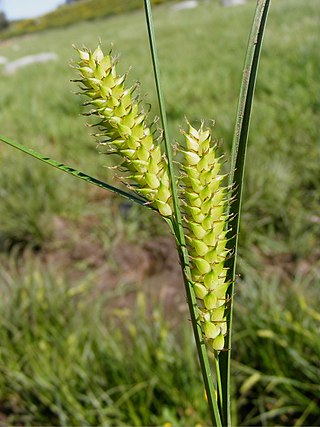
Carex vesicaria is an essentially Holarctic species of sedge known as bladder sedge, inflated sedge, and blister sedge. It has been used to insulate footwear in Norway and among the Sami people, and for basketry in North America.

Carex pensylvanica is a species of flowering plant in the sedge family commonly called Pennsylvania sedge. Other common names include early sedge, common oak sedge, and yellow sedge.
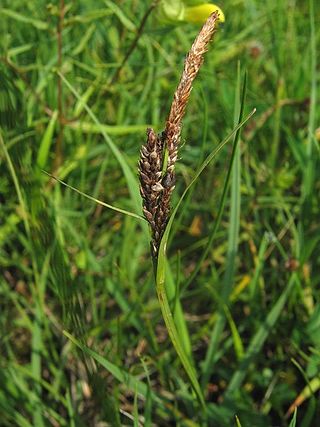
Carex panicea, commonly known as carnation sedge, is a plant species in the sedge family, Cyperaceae. It is known as grass-like sedge and can be found in Northern and Western Europe, and also in north-eastern North America. The plant produces fruits which are 3–4 millimetres (0.12–0.16 in) long, are egg shaped and spiked. Both male and female species leaves are pale blue on both sides.
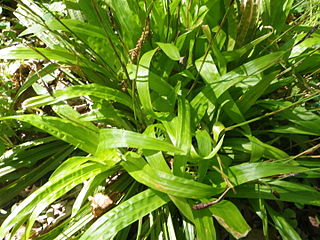
Carex plantaginea, commonly known as carex plantain, plaintainleaf sedge, or seersucker sedge, is a perennial herb of the sedge family.

Carex arctata, known as drooping woodland sedge, is a species of sedge native to eastern North America. It is sometimes called black sedge, compressed sedge, or drooping wood sedge. It occurs from Manitoba to the Maritimes in Canada, south to northwestern North Carolina, and west to Minnesota. Carex arctata grows in bogs, hardwood forests, and spruce forests.
Carex atrosquama, the lesser blackscale sedge, is a species of sedge that was first formally named by Kenneth Mackenzie in 1912. It is native to the northwestern United States and western Canada, from Alaska south to Utah and Colorado. It grows in alpine and subalpine meadows, as well as along rivers and streams in gravelly areas.
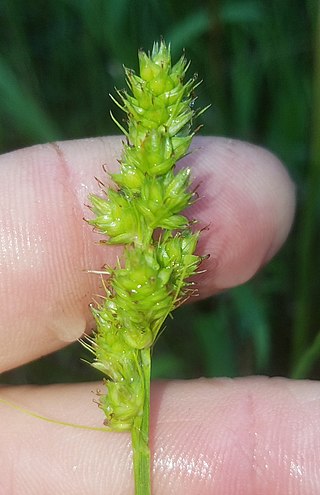
Carex austrina, known as southern sedge, is a species of sedge endemic to the southern and central United States.

Carex eburnea, known as ivory sedge, ebony sedge, and bristleleaf or bristle-leaved sedge, is a small and slender sedge native to North America, from Alaska and Newfoundland south to central Mexico.

Carex kobomugi is a species of sedge, known as the Japanese sedge or Asiatic sand sedge, that lives in sandy coastal areas of eastern Asia, and has become an invasive species in the north-eastern United States.
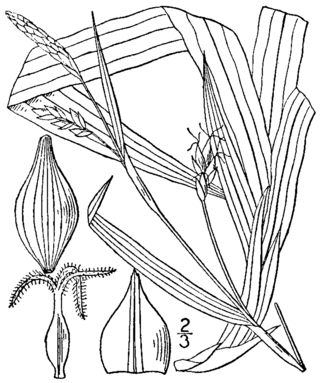
Carex careyana, commonly known as Carey's sedge, is a species of sedge found in the eastern United States and Ontario, Canada.

Carex viridula, known as little green sedge, green sedge, or greenish sedge, is a small flowering plant native to North America, Europe, Asia, and Morocco.

Carex bicolor, the bicoloured sedge, is a species of sedge native to North America, Northern Europe and Northern Asia. The International Union for Conservation of Nature has assessed the plant's conservation status as being of least concern because it has a widespread distribution and faces no particular threats.
Carex perdentata, the Texas meadow sedge, is a species of flowering plant in the family Cyperaceae, native to the U.S. states of Oklahoma and Texas. A perennial of savannas and open mesic forests, it can be used as a grass substitute in lawns, but requires a great deal of water.

Carex gigantea, the giant sedge, is a species of flowering plant in the family Cyperaceae, native to the southeastern U.S. and adjoining states. A perennial reaching 120 cm (4 ft), it is found at elevations from 0 to 400 m in swamps and wet clearings.
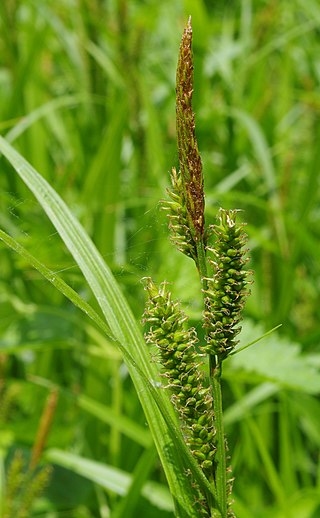
Carex scabrata, the eastern rough sedge, is a species of flowering plant in the family Cyperaceae. It is native to eastern Canada and the eastern United States, with one collection each in the Ozark and Ouachita mountains. A perennial reaching 90 cm (3 ft), it is found it wet areas with rich soils, particularly on seepage slopes.

Carex grisea, the wood gray sedge or inflated narrow-leaf sedge, is a widespread species of flowering plant in the family Cyperaceae, native to eastern Canada and the central and eastern United States. It resembles and co‑occurs with Carex amphibola in alluvial areas in forests, but where they co‑occur, Carex grisea is usually found in sandier, more alkaline soils.

Carex prasina, the drooping sedge, is a species of flowering plant in the family Cyperaceae, native to eastern Canada, and the north-central and eastern United States. It is usually found growing in rich soils in deciduous forests, typically in wet places such as streamsides, seeps, springs and fens.

















